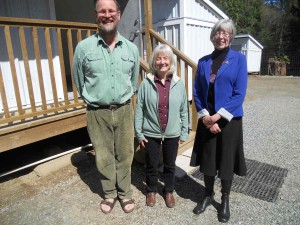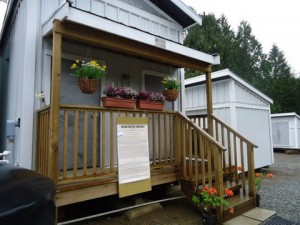The abattoir will close for floor repairs from Monday 23rd September, and will reopen on Wednesday October 9th for poultry. Lamb slaughter will resume on October 16th.
News
What are the most popular cuts of lamb?
The popular lamb cuts include:
- Whole Leg
- Half Leg
- Boned and Rolled Leg
- Rack
- Chops
- Riblets
- Neck Rounds
- Shoulder Chops
- Shoulder Rolled Roast
- Shoulder Stewing Lamb
- Shanks
- Any cut can also be ground on request
First Abattoir Society AGM – Sept 9th, Lions Hall, Bonnet Avenue, 7-9 pm.
The first Abattoir Society AGM will be held on Monday September 9th at the Lions Hall, Bonnet Avenue, 7-9 pm..
The meeting is open to members, membership will be available on the date, and interested members of the public are also welcome.
Poultry prices revised August 2013
The chicken prices now in effect have rarely brought in enough revenue to cover labour, and need to be adjusted to make sure that they cover labour, as well as supplies and overhead, or chicken processing cannot continue. The Abattoir Society directors have reviewed the poultry operation very thoroughly and have concluded that a discount for quantity is not justified in a plant that does everything by hand and does not have to stop work every time a new batch is started, as the larger operators do.
We also see very clearly that larger birds take more time. The time taken is directly proportional to the weight of the birds, so the price should reflect that. Two months ago we floated the idea of a surcharge of $2 for chickens over a certain weight. In discussing this with clients and with other small poultry abattoirs we came to the conclusion that the average chicken weight for the batch should be used instead of the number of chickens over a certain weight, which is more work to record and a possible source of errors and disputes. Our scales can print out the total batch weight and we know exactly how many chickens were processed, so the average weight is one simple calculation.
Therefore on August 15th the new fee scale will be in effect:
- $6 if average chicken weight less than 3 kg
- $7 if average 3.0 to 3.5 kg
- $8 if average over 3.5 kg
This abattoir was built with tax dollars and donations from farmers and supporters of local food production. It is owned by this community and operated by a volunteer board that employs island workers. It cannot survive in business if it continues to make a loss, so these changes have to be made. As the volume of work increases (and it has already surpassed the estimates used in the planning stages) and beef and pork are added, the financial picture should become rosier. Until that happens we ask for your understanding and co-operation in making this project a success.
Crowdfunding starts this week – we need your help!
 The abattoir is not quite finished and needs money to complete the work required to safely process pigs and cattle. We have a Salt Spring solution, called ShareSpring which is a new crowdfunding platform. This is intended to attract the attention of a wider public who would be willing to support this community’s efforts to increase food production in a sustainable way.
The abattoir is not quite finished and needs money to complete the work required to safely process pigs and cattle. We have a Salt Spring solution, called ShareSpring which is a new crowdfunding platform. This is intended to attract the attention of a wider public who would be willing to support this community’s efforts to increase food production in a sustainable way.
The campaign to “Save Our Farms” will strike a chord with all who care about animal welfare and this island’s economic health. The abattoir has already simplified meat production logistics and is providing job opportunities for local workers.
It can do far more once it is fully operational, (now handling sheep and poultry only) and with your help and the help of your social media contacts we can get there. Please pass this message on to your friends. If we can reach 5000 people who will donate $10 each that’s $50,000!
Click Here for the ShareSpring ‘Save Our Farms’ donations page
Duck news
The June 14th experiments with 29 young Pekin ducks revealed that they take at least 3 times as long as chickens to process, and are a lot more difficult to pluck cleanly. Some of them had to be partly or completely skinned. The price therefore needs to be triple the price listed for chickens.
However the time factor is a bigger problem at this time of year than the extra work and skill involved. For every 20 ducks booked we would have to turn away 60 chickens. From June to August this year we are fully booked and adding extra days for chickens, so taking ducks as well would reduce local meat production, and force chicken customers to go off island.
If there is enough interest in duck and goose processing we can assign specific days for it from September onwards, and book more staff on those days. If this might be of interest to you please “Contact us” with your tentative schedule.
Surcharge for extra large chickens
As of August 8th, when the chicks arriving now reach slaughter weight, there will be a surcharge of $2 if they weigh over 3 kg processed.
Salt Spring chickens sometimes grow as large as 4kg, or occasionally even more. This is causing a number of problems during processing because the equipment is not designed to handle such large birds.
The very large birds are usually older, so they are harder to kill and take longer to scald. Fewer can be scalded at one time because only 2 or 3 instead of 4 or 5 fit on the dunker. The plucker likewise cannot hold 5 large birds, and having fewer moving objects in it affects its efficiency, because plucking works better when the birds are tossed around and bump against the rubber fingers and each other. With only 2 birds they don’t make good all round contact with the plucking surfaces.
Big chubby birds also take up more rack space, further limiting what we can do in a day. With 5 or 6 pound birds (very roughly 2.5-3 kg) we can process 150 in a day. With giants it would be 100 or less, and would take double the time.
Duck Processing – Update
We did some experiments with waterfowl last November with rather mixed results. The ducks were of unknown age and some were very difficult to pluck, so we were not happy with the results. We are trying again this coming week with Pekin ducks, bred primarily for meat, and they will be at the ideal processing age. If this goes well and we are happy with the quality we will announce that on the website and will start processing young meat ducks. The price will be based on how long it takes to process them, and is likely to be more than for chickens.
Poultry Processing Changing to Thursdays
Starting the week of June 17th poultry processing will change to Thursday from Friday.
The booking clerk will contact all customers with Friday bookings to notify them of this change. We apologize for any inconvenience this may cause.
Abattoir Open House
 On April 16th the Lieutenant Governor, her Honour, the Honorable Judith Guichon, began her tour of Salt Spring with a visit to the abattoir. Her three guides, Jean Brouard, Anne Macey and Margaret Thomson have been deeply involved in the planning of the facility, and lately also in its operation. The Lieutenant Governor is very familiar with BC’s meat industry, through her involvement in cattle ranching in the Interior, and understands the need for concerted community effort to address the difficulties caused by the changes in the meat regulations.
On April 16th the Lieutenant Governor, her Honour, the Honorable Judith Guichon, began her tour of Salt Spring with a visit to the abattoir. Her three guides, Jean Brouard, Anne Macey and Margaret Thomson have been deeply involved in the planning of the facility, and lately also in its operation. The Lieutenant Governor is very familiar with BC’s meat industry, through her involvement in cattle ranching in the Interior, and understands the need for concerted community effort to address the difficulties caused by the changes in the meat regulations.
 Many people have now visited the abattoir, with the largest numbers on April 12th for the Open House. The grounds were decorated, courtesy of Foxglove Farm and Garden, and coffee and cookies were served. All the Abattoir Society directors and the chair of the Agricultural Alliance were there to explain how the equipment is used and why it had to be built the way it is. The high cost of construction is easier to understand if you see all the “extras” that were required, and the amount of labour that was involved in meeting all the sometimes conflicting requirements of all the agencies involved.
Many people have now visited the abattoir, with the largest numbers on April 12th for the Open House. The grounds were decorated, courtesy of Foxglove Farm and Garden, and coffee and cookies were served. All the Abattoir Society directors and the chair of the Agricultural Alliance were there to explain how the equipment is used and why it had to be built the way it is. The high cost of construction is easier to understand if you see all the “extras” that were required, and the amount of labour that was involved in meeting all the sometimes conflicting requirements of all the agencies involved.
Your donations are still needed. Click HERE for details.

